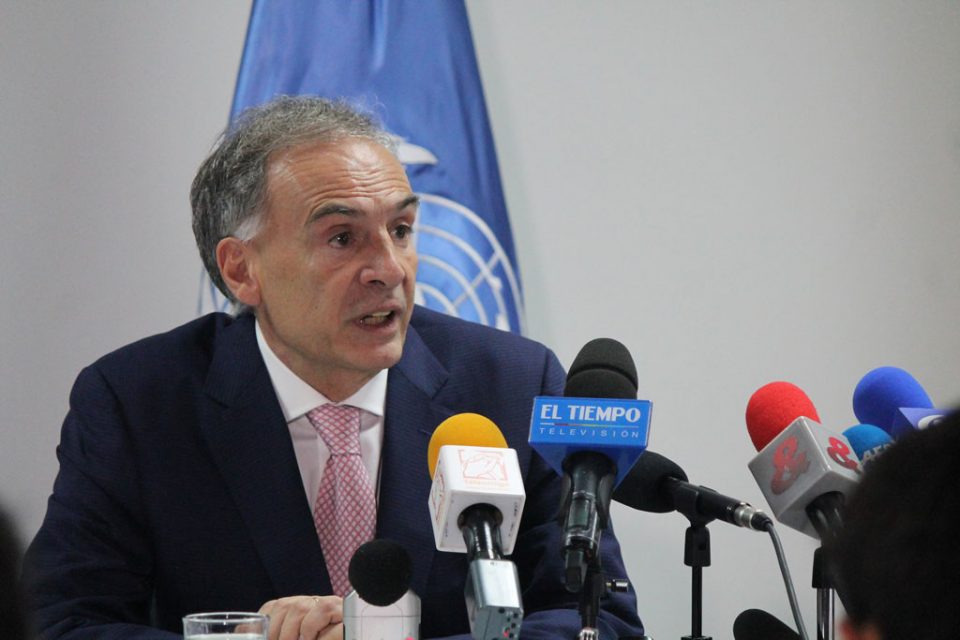
Jean Arnault, head of the UN mission in Colombia.
Following recent remarks by Jean Arnault, the head of the UN Mission in Colombia, Miguel Salazar analyses how the peace process is progressing.
Despite ongoing delays and inconsistencies in the implementation of Colombia’s recent peace deal with the FARC, Jean Arnault, the head of the UN Mission in Colombia, says that all parties involved are determined to continue making progress in order to meet the May 29 disarmament deadline.
At a press conference on Wednesday March 29, Arnault said that 85% of all arms belonging to the FARC had been identified and registered. The remaining weapons would be registered by the start of April.
“That [registration] process took a few days longer than originally anticipated due to weather conditions,” he said. “But we have now registered 85% of all weapons in the camps and we anticipate that by tomorrow, or the day after tomorrow, we will arrive at a figure of approximately 8,000 weapons registered.”
To date, UN observers have only collected arms belonging to the 140 FARC members participating in the tripartite Monitoring and Verification Mechanism, which also consists of Colombian government and UN officials. Arnault says that the UN expects to collect around 1,000 arms over the coming weeks.
The update provided a sense of progress, but also confirmed a growing fear that the disarmament process has been stuttering. It’s four months since Colombia’s Congress ratified the final peace deal signed by President Juan Manuel Santos and FARC leader Timochenko in November. According to the timeline stipulated in the peace agreement, 30% of the FARC’s weaponry was to be not only registered but collected by March 1, and 60% by April 30. The first deadline was not met, and it seems unlikely that the second one will be either.
Both sides have repeatedly accused one another of delaying the process. The government says the rebel group has intentionally stalled the handover of its weapons.
The FARC, in turn, has repeatedly blamed the government for failing to complete construction in all 26 demobilization zones. Many of the camps, which were originally scheduled for completion by January, were not finished until mid-February.
Others remain unfinished. According to Arnault, three FARC camps continue to be inaccessible to UN observers due to construction delays, while others still don’t have the necessary infrastructure to house the large UN containers which will store the FARC weapons.
Recent developments have also added to the logistical uncertainty surrounding the disarmament process. On March 27, 117 self-identified FARC ‘militias’ turned themselves in to Colombian authorities. It remains unknown whether the individuals are truly FARC militias and whether they can participate in the demobilization process, raising the question of whether or not additional dissident groups would attempt to join the peace process.
In addition, a series of recent meetings in Cartagena between government and FARC representatives have led to further adjustments to the disarmament process. In order to speed up the implementation of the peace agreement, the two sides agreed to include former rebels in crop substitution, demining, and educational efforts. These members will contribute most of the approximately 1,000 arms to be collected by UN officials over the coming weeks.
The meetings in Cartagena also renewed hope for a speedy disarmament process. In a move well received by the UN, the Colombian government committed to completing the construction of demobilization zones in April to ease the logistical nightmare in many unfinished camps.
“Moving from negotiation to implementation is an always painful move,” said Arnault. “While there are certain levels of doubt and skepticism, and although there are known objections to the peace agreement, at the same time it seems to us that there is an absolutely strong level of national support for the rejection of violence.”
But the UN Mission in Colombia also has a secondary role—overseeing the security of former conflict areas and their inhabitants. Failing to meet the May 29 deadline for disarmament could stall the UN’s mission to monitor the security of these regions.
This has been a major concern for some time. In November, Todd Howland, the Representative of the UN High Commissioner for Human Rights in Colombia, told Reuters: “When there are delays with the implementation of the accord, this means human rights violations.” Most recently, Amnesty International released a statement earlier in March saying that Colombia’s armed conflict is “alive as ever” in response to an uptick in violence against social leaders around the country.
Jean Arnault understands: “Colombia faces a rather special situation in relation to the current situation in conflict zones. This is a big reason why we stress the need to accelerate the implementation process.”





